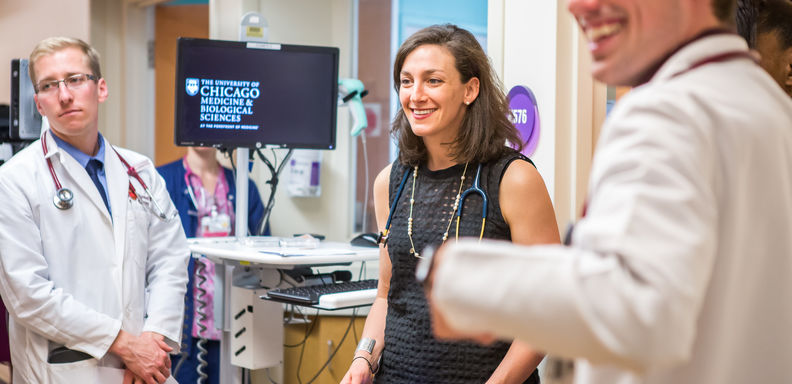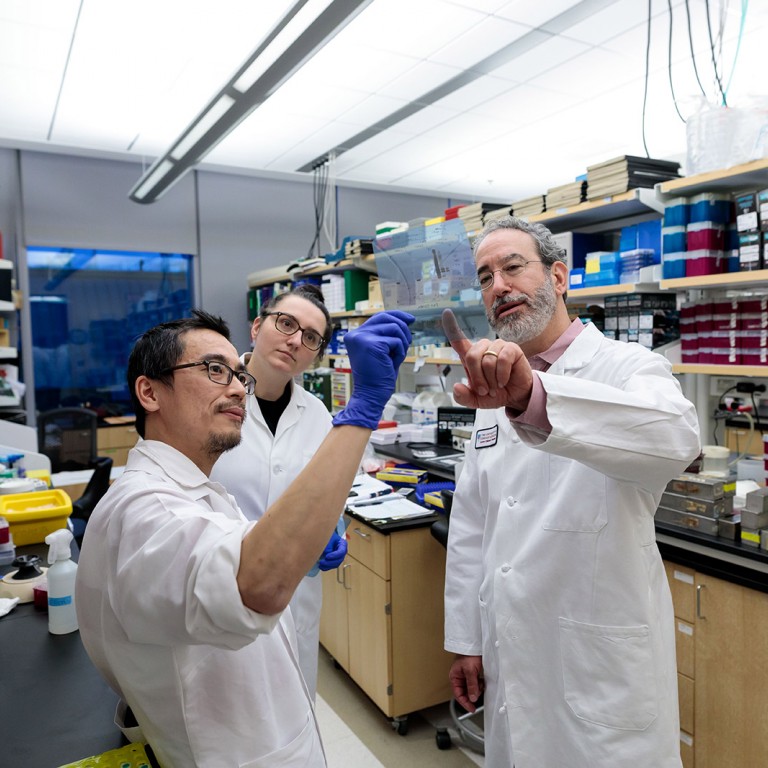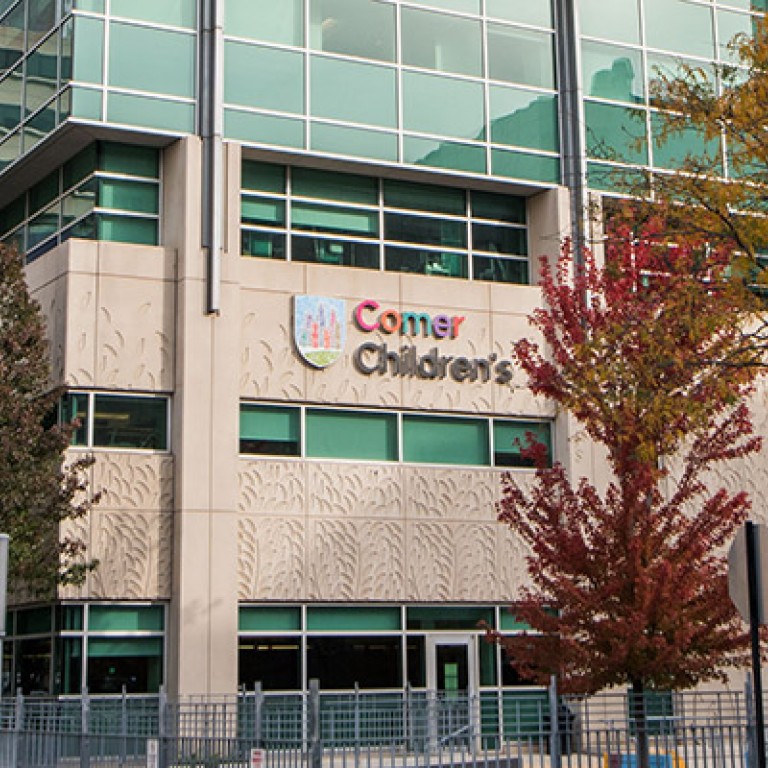The Clinical Informatics Fellowship program incorporates cross-training in The University of Chicago Graham School Master of Science in Biomedical Informatics (MScBMI). The MScBMI program – with full coursework available to clinical informatics fellows - provides the skills and knowledge to understand, build, and improve informatics solutions that help to address the most significant challenges in healthcare today.
Fellows enroll in the MScBMI program and will learn and master:
- Informatics methodology, applying tools and techniques to both research and applied problems in biomedical settings
- Effective communication with diverse professional audiences regarding informatics issues and solutions
- Management of biomedical informatics projects
- Understanding of the ethical, privacy, and data security issues in the field
Biomedical Informatics Courses Cover:
- Electronic health record systems
- Distribution and integration of clinical information systems
- Evaluation methods for health information systems
- Clinical decision support systems
- Telemedicine and telehealth
- Imaging systems
- Bioinformatics systems support
- Human-computer interaction
- Ethical and privacy issues
- Nursing, public health, dental and pharmacy information systems and issues
Epic’s Physician Builder program gives advanced training to physicians with a desire to learn how to make system changes directly. The courses are fast‐paced and describe the configuration of the system, including the discussion of guardrails for and potential unintended consequences of changes to each build item. The course is intended for forward-thinking physicians, physician’s assistants, and nurse practitioners who have experience using Epic and who enjoy solving puzzles. The classes cover many of the tools clinicians use on a daily basis.
The University of Chicago Medicine’s (UCM) Clinical Informatics Team launched their Physician Builder Program under the leadership of Associate Chief Medical Information Officer, Cheng-Kai Kao, MD. The Clinical Informatics Team kicked off the physician builder program in 2018, on-boarded 20+ physician builders, developed governance for project approval, and provided 1:1 tech support in partnership with the IT department and Epic tech support. As a clinical informatics fellow, you will have the opportunity to participate in the physician builder program.
The Association for Pathology Informatics (API) is a scientific society that is dedicated to furthering the discipline of Pathology Informatics. As a clinical informatics fellow, you will be provided with a complimentary membership as part of the larger institutional membership. The Association provides fellows with significant complementary educational resources and academic opportunities.
The mission of the Center for Healthcare Delivery Science and Innovation (HDSI) is to connect scholars and leaders across University of Chicago Medicine and beyond to catalyze innovation and discovery in healthcare delivery and was created to establish UCM as a leader in the emerging field where science and healthcare delivery intersect by:
- To facilitate the use of rigorous and innovative approaches to improve patient care by promoting collaboration between healthcare delivery providers, leaders, and scholars.
- To influence the national conversation by supporting the dissemination of HDSI Scholars’ work.
- To enable mentorship and training in HDSI to cultivate the next generation of scholars and leaders.
As a clinical informatics fellow, you will be offered the opportunity to lead and participate in these educational events that foster scholarship, discussion, and healthcare delivery science research.
The Institute for Translational Medicine (ITM) links researchers and community organizations with funding, education, and resources to find effective ways to prevent and treat disease in real-world settings. ITM works with a group of 60 institutions toward advancing medicine in innovative ways. Their mission is to train scientists and health care providers, partner institutions, and in the community to determine the molecular underpinnings of disease and disease predisposition, and to develop, test, and implement the most effective personalized therapies that are rigorous, valid, efficient, ethical, and respectful of the communities’ needs and values. As a clinical informatics fellow, you will have the opportunity to join the movement and contribute to these research breakthroughs.
The Institute for Population and Precision Health connects researchers from multiple academic units across University of Chicago, and provides them with population-based resources to tackle the most challenging biological, behavioral, and economic problems in preventive and population medicine. As a clinical informatics fellow, you will have the opportunity to help leverage these advances to improve the ability to prevent disease, promote health, and reduce health disparities.
The University of Chicago Clinical Pharmacology and Pharmacogenomics Training Program offers a variety of training that fits your career goals. Opportunities include training in Clinical Therapeutics and Pharmacogenomics in Clinical Implementation. As a clinical informatics fellow, you will have the opportunity to apply for additional Pharmacology training
The Center for Data and Computing is a research center for developing new methods in computation and data analytics and applying them to ambitious projects across the full spectrum of science and scholarship. It provides computationally focused, interdisciplinary projects at UChicago with resources, space and a network for collaboration on campus and around the world. The center will provide opportunities for clinical informatics fellows to participate in data science and computing collaborations.
The Polsky Center for Entrepreneurship and Innovation bridges the gap between knowledge and practice, idea and action, and research and impact through education, partnerships, and new venture creation. It brings the power of ideas in the laboratory, classroom and community to the world. Through education, resources, and programs, the Polsky Center commercializes discoveries, partners with companies, and attracts venture capital. The Polsky Center manages the University of Chicago’s technology transfer function that manages all University-based intellectual property originating from faculty research and discoveries, which can be licensed to industry partners and investors. The Polsky Center provides venture creation support for all members of the University of Chicago community as well as the local South and West Side community entrepreneurs. As a clinical informatics fellow, you will be able to participate in a variety of educational settings from the Polsky Center.
Chicago offers many startup resources. For example, MATTER is a healthcare startup incubator, community nexus and corporate innovation accelerator and is composed of hundreds of startup and growth stage companies from around the world, dozens of corporate partners and programs supporting healthcare entrepreneurship and innovation. Fellows will have the opportunity to connect and collaborate in this community of healthcare innovators.
Since the lab’s founding in 1946, the University of Chicago has managed and operated the Argonne National Laboratory—a laboratory that has become a scientific leader for the U.S. Department of Energy’s (DOE) and the country. Through UChicago Argonne, LLC, the University of Chicago brings the best of commercial practices and marshals the talent of Illinois’ leading research universities to lead Argonne into the future. Argonne has excelled in integrating world-class science, engineering, and user facilities to deliver innovative research and technologies and new knowledge that addresses the scientific and societal needs of our nation. As a clinical informatics fellow, you will be able to participate in research conducted at the laboratory.
Self-nominated council comprised of pediatric residents at every level of the program and the Pediatric Chief Residents. The REC provides a formal pathway for residents to become involved in programmatic improvement.
Self-nominated council comprised of pediatric fellows across various levels and subspecialties. The FEAC works with the Pediatric Medical Office and offers a formal mechanism for fellows to unite and have a part in departmental and programmatic improvement.
| PGY1 | $63,654 |
| PGY2 | $67,685 |
| PGY3 | $70,019 |
| PGY4 | $73,202 |
| PGY5 | $76,385 |
| PGY6 | $77,976 |
| PGY7 | $80,628 |
| Vacation | All residents/fellows receive four-weeks of paid vacation leave per academic year |
| Sick Leave | All residents/fellows receive five days of paid sick leave per academic year |
| Leave of Absence | All residents/fellows are eligible for a four-week paid leave for maternity-related purposes or required medical care |
University of Chicago house officers are eligible for a benefits package that includes dental coverage, flexible spending accounts, health insurance coverage, life insurance, long term disability, personal accident insurance, tuition remission for spouses and children, supplemental retirement annuities, and workers' compensation.
The Medical Center provides medical malpractice liability coverage for all residents for activities performed in connection with assigned duties as a resident at the University of Chicago and at off-site rotations with prior written approval. The coverage is a composite of self-retained coverage funded by a composite of self-retained coverage funded by a trust fund and purchased excess commercial insurance.







